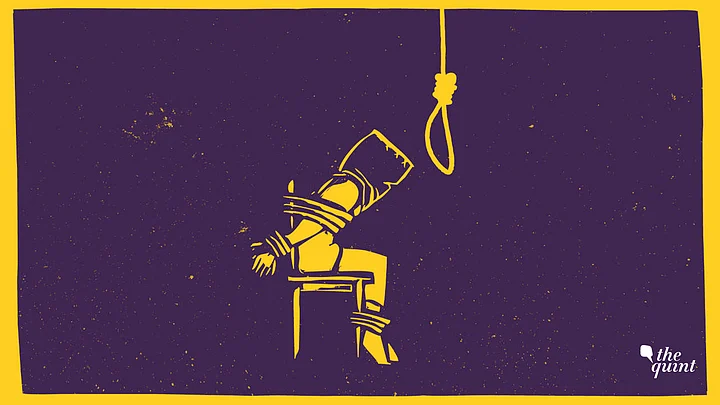Can 40 minutes of writhing in pain be considered ‘quick’ when one is being hung to death? The Centre, in its recent counter-affidavit responded to the PIL filed by Advocate Rishi Malhotra, appears to think so. The PIL challenged the constitutional validity of Section 354(5) of Code of Criminal Procedure 1973, i.e hanging by neck till death, as being ultra vires Article 21.
The affidavit says that hanging is not barbaric, inhuman and cruel when compared with execution by a firing squad and lethal injection.
Nothing Painless about Hanging to Death
A logical corollary to Article 21 which guarantees that ‘no person shall be deprived of his life or personal liberty except according to procedure established by law’, is that a person may be deprived of life in accordance with procedure prescribed by law.
While upholding S. 354(5) as being consistent with Article 21, the Supreme Court in Deena v. Union of India said that a quick, simple and painless method of execution is favourable. It endorsed hanging as an acceptable mode of execution. However, this reasoning stands to be questioned after a perusal of the 187th Law Commission of India Report on the mode of execution of death.
This report contends that on an average, an execution by hanging takes 40 minutes, whereas in execution by lethal injection, the entire process takes 5-9 minutes and in shooting, the execution takes no more than a few minutes.
While execution by hanging does not involve any specific skill or technical equipment, execution by firing or lethal injection requires trained personnel and equipment. All methods of execution contain some amount of pain but efforts are being made to make them as painless as possible. However, since these executions are carried out by people on other people, there is always room for human error. None of these methods is perfect.
The Idea of Personal Autonomy
The celebrated legal and moral philosopher Joseph Raz, in his theory of ‘personal autonomy’ says that all individuals should be given the right to choose what is best for them in a given circumstance. By personal autonomy he meant that all individuals should be given the right to make decisions, and this right should be free of coercion and manipulation by others. He believes that individuals have an inherent right to autonomy which they usually fail to exercise.
How would having personal autonomy help when death is staring a convict in the face? The idea of ‘personal autonomy’ would do well to be extrapolated in the realm of execution methods. The agony of a convict on death row cannot be completely removed in the face of the inevitable death sentence. However, it can be mitigated by giving him/her options vis-à-vis the method of execution.
This right to choose is clearly exemplified in the recent judgment in Common Cause v. Union of India confirming the right of a terminally ill patient to choose passive euthanasia, wherein Justice Dipak Misra said that “right to live with dignity” would mean existence of such a right up to the end of natural life.
The court said that Article 21 could be rendered meaningless unless it encompassed right to dignity within its sphere. The right to choose ought to be extended to inmates on death row with respect to providing them with an informed choice on the modes of execution. The court, while emphasising on the inviolability of human dignity, in M Nagaraj vs Union of India, enjoined the State to take positive steps to ensure its preservation.
Right to Live, Right to Dignity
The significance of giving choice to the inmates with respect to mode of execution can be read into in the words of Justice DY Chandrachud in KS Puttaswamy vs Union of India, where he and the court emphasise on ‘decisional autonomy’ as one of the three essential prongs of the definition of privacy which consists of “repose, sanctuary and intimate decisions”. Freedom to choose is a necessary pre-condition for privacy to be realised in its true spirit. The fundamental rights conferred under Article 19 can be truly realised where an individual is entitled to make decisions based on his/her preferences.
Article 19 read along with Article 21 paves the way for creation of liberty to make choices on various facets of life. The right to choose has a far reaching impact on decisions ranging from everyday decisions such as what to eat and what to wear to crucial life choices such as those pertaining to procreation, sexual orientation, personal intimacies and so on.
Prisoners on death row do not have a choice between life and death, but at least choice can be extended to them on the mode of execution.
Therefore, this right to privacy of mind is an inalienable right, something that the State should not only facilitate but also protect. It is this respect for dignity of human life, privacy and right to self-determination which Article 21 embodies. This right extends to all citizens, even to prisoners on death row.
The current system and procedural law provides just one option to civil and criminal prisoners. We are not contesting the practice of capital punishment. That would call for another debate. Our contention lies in the fact that prisoners by virtue of them being captives, cannot be denied their Right to Dignity. It is time for the Centre to deliberate upon a policy to modify the death penalty which would factor in the right of the inmate to make an informed choice about his/her death. A suitable amendment to Section 354(5) should follow.
(Sonia Chaudhary and Harshita Gupta are first year postgraduate law students at Jindal Global Law School. This is a personal blog and the views expressed above are the authors’ own. The Quint neither endorses nor is responsible for them.)
(The Quint is now on WhatsApp. To receive handpicked stories on topics you care about, subscribe to our WhatsApp services. Just go to TheQuint.com/WhatsApp and hit Send.)
